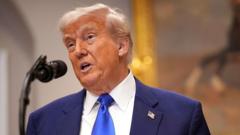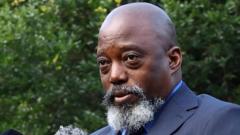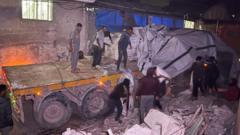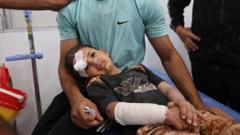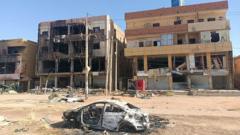Residents of Bukavu are experiencing chaos as M23 rebels reportedly advance, leading to fears of escalating violence and regional conflict. The situation has prompted international concern, as the UN and EU call for respect for DR Congo's territorial integrity.
Chaos Erupts in Bukavu as M23 Rebels Advance
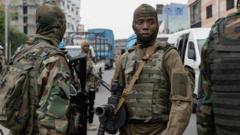
Chaos Erupts in Bukavu as M23 Rebels Advance
Gunfire and looting in eastern DR Congo escalate fears of a regional conflict following M23 rebel advances.
As M23 rebels continue their offensive in eastern Democratic Republic of Congo, Bukavu, a city with a population of over a million, has plunged into chaos. Recent reports indicate sporadic gunfire and widespread looting, with residents remaining indoors for safety. The unrest follows the M23 group's capture of significant territories, including Kavumu airport, which lies north of Bukavu.
Conflicting reports loom over whether the M23 rebels have entered the city itself. Although claims from the M23 suggest their imminent presence, local officials and army sources deny this, indicating rebels have not reached the city center yet. Nevertheless, with some residents witnessing armed groups in the northern suburbs, alarm is palpable.
The situation has drawn serious concern from both the United Nations and the European Union. UN Secretary-General Antonio Guterres emphasized the need to avoid regional escalation at an African Union summit, asserting that the sovereignty of the DR Congo must be safeguarded. In response to the deteriorating situation, the EU has considered all options, hinting at possible international intervention.
As chaos ensues, looters have targeted critical supply depots, including one run by the World Food Programme, exacerbating humanitarian issues in a nation rife with conflict. A local woman described her desperation and fear of venturing outside amidst rampant looting, highlighting the prevailing atmosphere of neglect and fear within the community.
The backdrop of this conflict involves longstanding accusations by the Congolese government against Rwanda, alleging it supports the M23 group to exploit DR Congo's rich mineral resources, a claim Rwanda has refuted. This situation underscores the broader geopolitical implications, with Uganda's army chief threatening military action against Congolese forces. Such rhetoric raises concerns of a resurgence of larger-scale warfare reminiscent of the conflicts of the 1990s and early 2000s, which caused millions of deaths.
The continued instability in eastern DRC signals a potential re-engagement of neighboring countries in the conflict, a situation that could lead to further humanitarian crises and devastation in an already tumultuous region. With armed groups asserting control and international stakeholders weighing their options, the coming days will be crucial in determining the trajectory of security and peace in the area.


